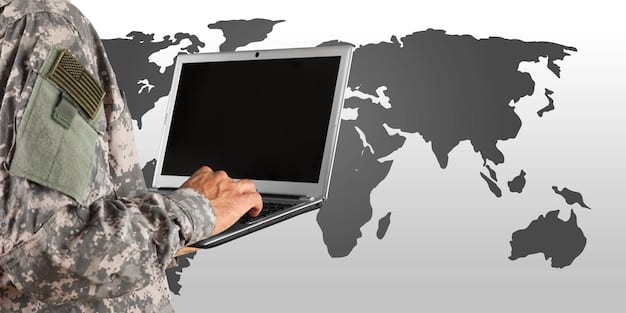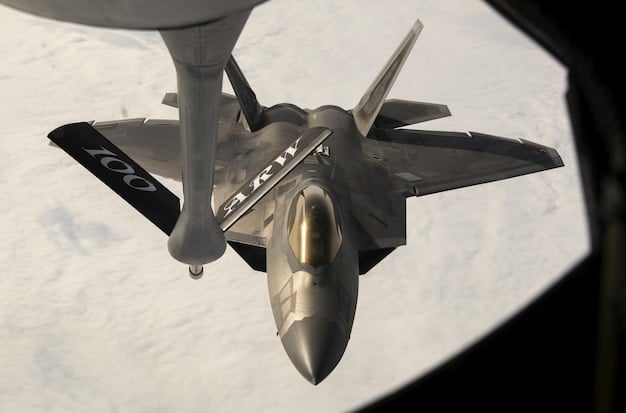Implications of US Arms Sales on Global Stability: An In-Depth Analysis

The implications of the latest US arms sales on regional stability are multifaceted, encompassing shifts in military power dynamics, potential escalation of conflicts, impacts on human rights and civilian populations, and broader geopolitical realignments.
The United States is the world’s largest arms exporter, and its arms sales have significant implications for regional stability. Understanding what are the implications of the latest US arms sales on regional stability requires careful consideration of various factors.
Understanding US Arms Sales and Their Global Reach
The United States has long been a dominant player in the global arms market. Its decisions regarding arms sales reverberate across continents, influencing military balances and international relations.
Understanding the scale and scope of these sales is crucial for grasping their potential effects on regional dynamics.
Trends in US Arms Exports
US arms exports have generally been on the rise in recent years. This increase is driven by a confluence of factors, including geopolitical tensions, the desire of allies to modernize their militaries, and the economic incentives for the US defense industry.
It is important to examine the specific types of weapons being sold and the regions to which they are being delivered to fully comprehend the potential consequences.
Major Recipients of US Arms
Several countries consistently rank among the top recipients of US arms. These include nations in the Middle East, Asia, and Europe. The rationale behind these sales often involves strategic alliances and the perceived need to counter regional threats.
However, these arms transfers can also exacerbate existing conflicts and contribute to an arms race.
- Saudi Arabia: A major purchaser of US military equipment, driven by concerns about regional rivals like Iran and involvement in conflicts like the Yemen civil war.
- Australia: Seeks advanced weaponry and defense systems to maintain a technological edge in the Indo-Pacific region amid growing Chinese military power.
- Japan: Modernizing its military capabilities to counter perceived threats from North Korea and China, requiring a steady supply of US-made defense systems.

The implications extend beyond military capabilities, affecting political stability and contributing to the complex tapestry of international relations.
Impact on Regional Power Balances
Arms sales inevitably alter the balance of power within regions. When one state acquires advanced weaponry, it can create a sense of insecurity among its neighbors. This often leads to a cycle of arms acquisitions as countries seek to maintain or restore their relative strength.
This dynamic can contribute to heightened tensions and increased risk of conflict.
The Arms Race Phenomenon
An arms race occurs when two or more states engage in a competitive accumulation of weapons. This can be driven by a variety of factors, including mutual distrust, the desire for prestige, and the pursuit of military advantage.
US arms sales can inadvertently fuel arms races by triggering a chain reaction of military buildup among regional rivals.
Case Studies: Shifting Balances
Examining specific cases can illustrate the impact of US arms sales on regional power dynamics. For example, the transfer of advanced fighter jets to one country can dramatically alter the air power balance in a region, prompting neighboring states to seek comparable capabilities.
Similarly, the sale of missile defense systems can affect the strategic calculus of potential adversaries, influencing their willingness to engage in aggressive behavior.
- The Middle East: US arms sales have long played a significant role in the region’s power dynamics, influencing conflicts between Saudi Arabia and Iran, and impacting the Arab-Israeli balance.
- Indo-Pacific: The US is increasing arms sales to countries like Australia and Japan to counter China’s military rise, potentially leading to heightened naval and air force competition in the region.
- Eastern Europe: Arms sales to countries bordering Russia, such as Poland and the Baltic states, are intended to deter Russian aggression but could also escalate tensions with Moscow.

This necessitates a comprehensive understanding of geopolitical landscapes and potential ripple effects.
The Role of US Arms in Conflict Escalation
While arms sales are often justified as a means of promoting stability and deterring aggression, they can also have the unintended consequence of escalating conflicts. The availability of advanced weaponry can tempt states to resort to military force to achieve their objectives.
Moreover, arms sales can embolden authoritarian regimes and contribute to human rights abuses.
The Temptation of Military Solutions
When a state possesses a significant military advantage, it may be more inclined to use force to resolve disputes. This is particularly true in regions where there are unresolved territorial disputes or simmering ethnic tensions.
US arms sales can inadvertently create a climate in which military solutions are seen as more viable, increasing the risk of conflict.
Impact on Human Rights and Civilian Populations
Arms sales to countries with poor human rights records raise serious ethical concerns. These weapons can be used to suppress dissent, commit atrocities, and perpetuate cycles of violence. The impact on civilian populations can be devastating, as seen in conflicts around the world.
It is crucial for the US to carefully consider these factors when making decisions about arms sales.
- Yemen: US-supplied weapons have been implicated in civilian casualties and human rights abuses during the ongoing conflict, raising concerns about oversight and accountability.
- Myanmar: Arms sales to the military junta have faced criticism due to the regime’s suppression of democratic movements and human rights violations.
- Philippines: US arms sales have been controversial due to concerns about extrajudicial killings and human rights abuses in the government’s war on drugs.
Careful calibration and a focus on ethical considerations are essential to mitigate these risks.
Geopolitical Implications and Alliances
US arms sales are not simply commercial transactions; they are also strategic tools that can shape geopolitical alliances and influence regional alignments. By providing weapons to certain countries, the US can strengthen its relationships and promote its interests.
However, these decisions can also alienate other states and create new tensions.
Strengthening Strategic Partnerships
Arms sales can be a powerful means of solidifying strategic partnerships. By providing allies with advanced military capabilities, the US can enhance their ability to defend themselves and contribute to regional security. This can foster closer cooperation and strengthen the overall alliance.
However, it is important to ensure that these partnerships are based on shared values and a commitment to peaceful resolution of disputes.
Potential for Alienating Other States
Arms sales can also have the unintended consequence of alienating other states. When the US provides weapons to one country, it may be seen as taking sides in a regional conflict. This can create resentment and undermine efforts to promote peace and reconciliation.
The US must carefully weigh these potential consequences when making decisions about arms sales.
- Taiwan: US arms sales to Taiwan are a critical factor in deterring Chinese aggression but also strain relations with Beijing.
- Turkey: The US decision to halt F-35 sales to Turkey due to its purchase of Russian missile defense systems demonstrates the complexities of balancing alliances and strategic interests.
- India: Increasing US arms sales to India are aimed at strengthening a strategic partnership to counter China, but this could impact relations with Pakistan.
Strategic foresight and diplomatic nuance are necessary to ensure that arms sales contribute positively to geopolitical stability.
Economic Dimensions of US Arms Sales
In addition to their strategic and political implications, US arms sales also have significant economic dimensions. The arms industry is a major employer in the US, and arms exports contribute to the country’s trade balance.
However, the economic benefits of arms sales must be weighed against the potential costs, including the risk of fueling conflicts and undermining stability.
The Arms Industry and US Employment
The US arms industry is a vast enterprise that employs hundreds of thousands of people. Arms exports provide a significant source of revenue for these companies, supporting jobs and stimulating economic growth. This creates a powerful incentive to promote arms sales, even when they may have negative consequences.
Balancing Economic Benefits and Security Concerns
The US must carefully balance the economic benefits of arms sales with the potential security risks. It is important to avoid prioritizing short-term economic gains over long-term stability and human rights concerns.
This requires a comprehensive assessment of the potential consequences of each arms sale, as well as a commitment to responsible arms export policies.
- Defense contractors: The US defense industry benefits immensely from arms sales, driving innovation and technological advancements.
- Trade balance: Arms exports help reduce the US trade deficit, boosting the economy.
- Geopolitical influence: Arms sales create dependencies and influence over recipient countries’ security policies.
A holistic approach that considers both economic and ethical factors is essential for responsible policymaking.
Policy Recommendations and the Path Forward
Given the complex implications of US arms sales, it is essential to adopt a more comprehensive and responsible approach. This requires strengthening oversight mechanisms, promoting greater transparency, and prioritizing human rights considerations.
By implementing these policies, the US can reduce the risk of fueling conflicts and undermining stability, while still maintaining its strategic partnerships and promoting its economic interests.
Strengthening Oversight Mechanisms
The US government should strengthen its oversight mechanisms to ensure that arms sales are consistent with its values and strategic goals. This includes conducting more rigorous reviews of potential human rights impacts, as well as enhancing monitoring and enforcement of arms export controls.
Promoting Transparency and Accountability
Greater transparency in arms sales is essential for promoting accountability. The US should publish more detailed information about its arms exports, including the types of weapons being sold, the recipients, and the intended uses. This would allow for greater public scrutiny and informed debate.
- Enhanced vetting: Implement stricter human rights vetting processes for countries receiving US arms.
- Congressional oversight: Strengthen congressional oversight of arms sales decisions, increasing transparency and accountability.
- Multilateral cooperation: Work with allies to develop common standards for responsible arms exports, preventing the diversion of weapons to conflict zones.
| Key Aspect | Brief Description |
|---|---|
| ⚖️ Power Balance | Arms sales can alter regional power dynamics, potentially fueling arms races. |
| 🛡️ Conflict Escalation | Increased access to weapons can tempt states to use military force for their goals. |
| 🤝 Geopolitical Alliances | Arms sales influence alliances, strengthening partnerships but potentially alienating others. |
| 💰 Economic Factors | Arms industry boosts employment and trade, balancing economic gains with security risks. |
Frequently Asked Questions
▼
The primary drivers include strategic alliances, countering perceived threats, and economic incentives for the US defense industry, boosting employment.
▼
They can alter balances by increasing military capabilities of recipient states, leading to arms races as other nations seek to match that power.
▼
Weapons sold to countries with poor human rights records can be used for suppression and violence, impacting civilian populations heavily.
▼
They help strengthen partnerships, promoting US interests, but can alienate others, creating tension, shifting regional alignment.
▼
Experts recommend stronger oversight, greater transparency, and an increased priority on human rights when deciding on sales.
Conclusion
In conclusion, the implications of US arms sales on regional stability are profound and multifaceted, encompassing shifts in power balances, potential escalation of conflicts, impacts on human rights, and broader geopolitical realignments, requiring careful consideration and responsible policy-making.





